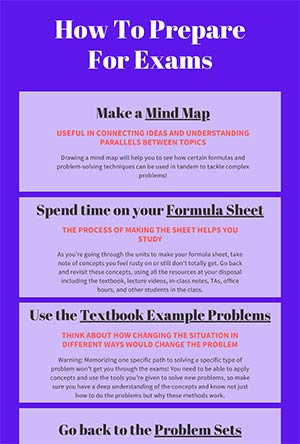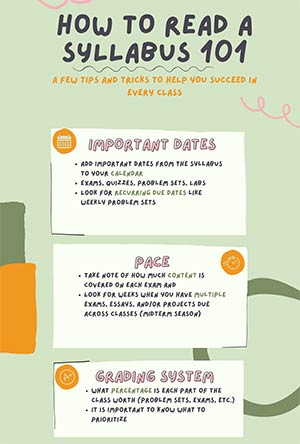Department ofPhysics and Astronomy
Academic Resources
The OAR
The Office of Academic Resources (OAR) has many great resources that anyone can take advantage of. They can connect you with a peer tutor, provide academic coaching, have many resources on everything from tips on effective note-taking to weekly planner templates that you can peruse, as well as lots of workshops; take a look when you get an email from them!
Study Groups
Having other students to work with is important to succeeding in (and enjoying!) your physics classes. If you’re looking for a study group, fill out our form to get connected with other students in your class!
Infographics
Clinic & Office Hours
Clinic Details
Physics classes typically have two TAs who hold “Physics Clinic” twice a week. During these sessions, TAs answer questions from students, often on problems from the homework; they will not tell you how to do the problem or confirm the right answer, but they will help you work through the problem. The TA’s have been through the classes before and they are really approachable and eager to help, so this is a great resource that everyone should use! Clinic can also be a place where students collaborate with each other, so it’s a good place to meet other students and work with your peers.
You should have some questions ready when you go to Clinic, but this doesn’t need to be intimidating! Here are some examples of questions you could bring to clinic:
- “I have no idea where to start with this homework problem”
- “This is what I’ve figured out about X problem, but then I got stuck”
- “I don’t understand X concept at all, can we talk through it?”
- “I got frustrated on X and felt like giving up so now I’m here”
Office Hours Details
Go to office hours! Not only are your professors a great resource to help you better understand physics, office hours are also an important way to build personal connections with your professors, which can be an incredible and central part of your college experience. This can help you choose a thesis advisor, get involved with research, and get letters of recommendation (for graduate school, internships, summer programs, etc.). If they don’t know you, it’s hard for them to write an individualized letter that speaks to your strengths!
You should feel free to email the professor to schedule a meeting outside their normal office hours if those times can’t work for you!
Example of what an office hour session can look like:
Deepening academic understanding
Jackson is confused about an application of Gauss’ Law that they were doing in class. Sometimes there’s a 2 in the denominator and sometimes there isn’t, and he can’t figure out why. The professor pulls up a white board and draws out all the possible scenarios, walking through them with Jackson to explain not just the mysterious 2 but deepen Jackson’s overall understanding of the concept. The professor then posts a picture of the whiteboard to the Slack channel to help other students with this question.
Career advice
Lillian doesn’t know what she wants to do after she graduates… She’s thinking about an engineering degree, or maybe a physics PhD, or maybe something else entirely, and she’s looking to get some knowledge about these paths from someone in the field. She originally scheduled a 15 minute meeting with the professor, but they end up talking for 45 minutes, and Lillian goes away with lots of new ideas and places to look for more information. The professor will also introduce some of her colleagues to Lillian so that she can reach out to them and learn more about certain topics/fields.
Course advice
Alex is having trouble selecting courses for next semester. They go to office hours to ask the professor for advice about upper-level physics and math courses. The professor is able to give them specific advice based on their academic interactions in and out of class. Alex is now well-informed about the classes they can take and builds a reasonable course schedule.
Sheena is unsure if she should be double-majoring and if she needs to write two theses. She is also confused about the costs and benefits of overloading on classes during a regular semester. Her professor introduces to her the option of doing the interdisciplinary major which would allow Sheena to explore interdisciplinary interests without having to commit to writing another thesis.
Getting Around
Feel free to let us know what you'd like to see on the page, parts that are confusing, and any other thoughts! Share Your Thoughts






